Overview
Scottsdale Arizona is a rapidly growing city in the Phoenix metropolitan area of Maricopa County, home to almost 250,000 people. In 2015 Scottsdale embarked on a digital services modernization project with the goal of making commonly requested public data easily accessible. This initiative began with the publication of a handful of public datasets and the establishment of the Open Data Publishing Process (2017). A Bloomberg Philanthropies program called “What Works Cities” reached out to Scottsdale and helped further incentivize their data programs by establishing milestones and additional standards. What Works Cities helped grow Scottsdale’s open data initiative into a robust and well-governed program.
There are currently more than 80 datasets available through Open Data Scottsdale (data.scottsdaleaz.gov), which feed an interactive site (ScottsdaleEZ Dashboard) which residents and local business can use to explore various data and analytics solutions.
Goals and Aspirations
Scottsdale’s open data initiative is focused on distributing information in relevant and effective ways to foster community engagement. In 2023 the city of Scottsdale published an Open Data Standard designed to “support the city in building and delivering transparent reliable and informative data services to its citizens and businesses.”
Information Sharing. The stated purpose of the Scottsdale Open Data initiative is to share information. Information sharing is designed to improve inter-agency public services, and to empower residents to use data to understand their community and government. The data includes a wide variety of topics from police enforcement, emergency response, to city services.
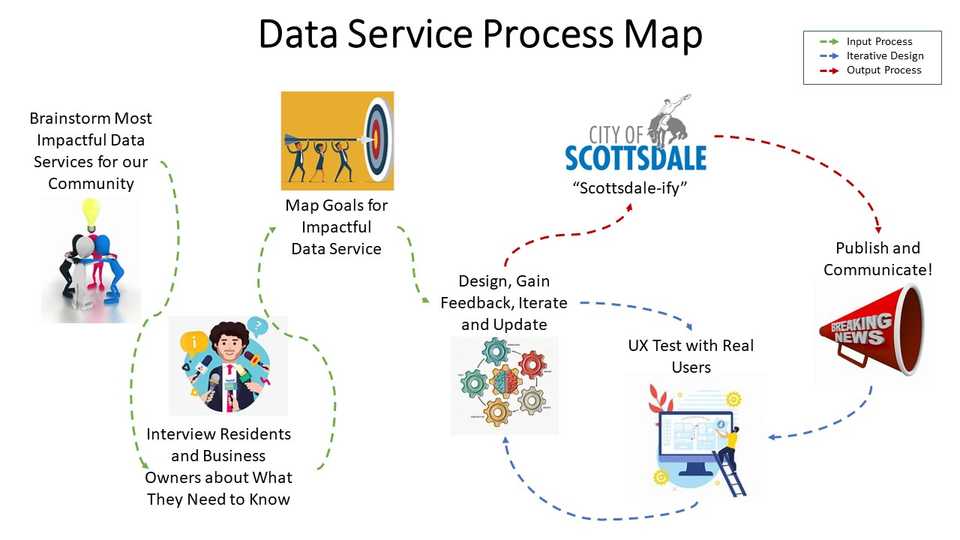
Transparency. Scottsdale Open Data initiatives are structured around Administrative Regulation 135 and 297, the Scottsdale Digital Privacy Policy and Open Data Program. These regulations specify how and when data is collected and used. Additionally they highlight the principles of minimization (collect only what is necessary to provide services and conduct business), and accountability (maintain documentation available for public review and third-party monitoring to evidence compliance).
Reliability. The 2017 Open Data Publishing Process is designed to provide the most useful data services, and provides predictability that the data set will retain available and functional. The city has limited resources to create data and analytical services, so it regularly reviews and selects the most impactful services to develop. Data reliability also informs how often datasets are updated, as none of the public datasets are “real time.”
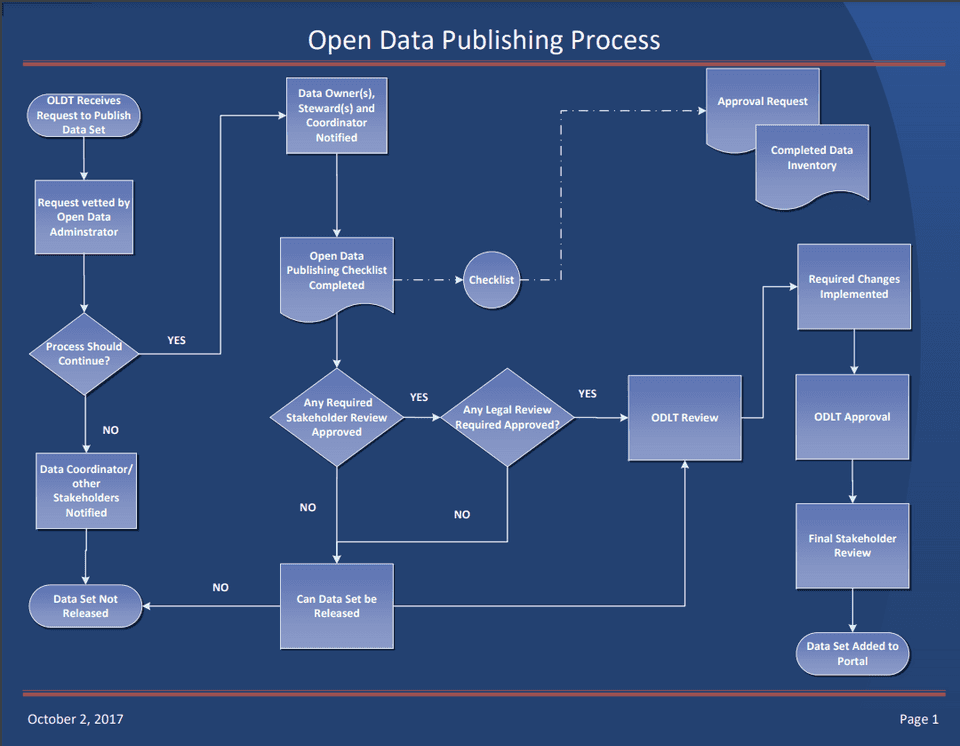
Key Characteristics
Scottsdale data services is a small team of three people (as of May 2024). This team is responsible for building and maintaining the datasets and dashboards that the city publishes. A significant part of this responsibility is monitoring data usage to anticipate future needs and build the right tools to serve the community.
ScottsdaleEZ Dashboard. ScottsdaleEZ Dashboard visualizes datasets. Supports transparency and introduces new users to open data through education. Empowers residents to hold city accountable. This is the landing page for data users and allows citizens to access tools the city has already implemented (such as the short term rental dashboard).
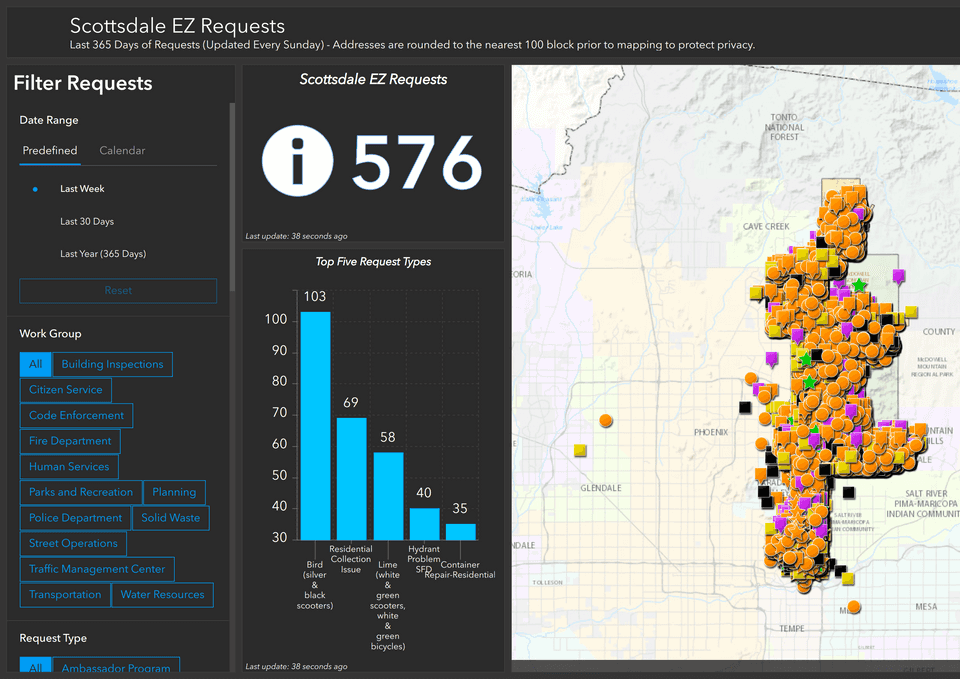
API. 88 datasets with open access to frequently updated information through public API. Maximizes accessibility and predictability to foster collaboration and innovation. This is public data the city makes available for development, but has not built tools around. Provided
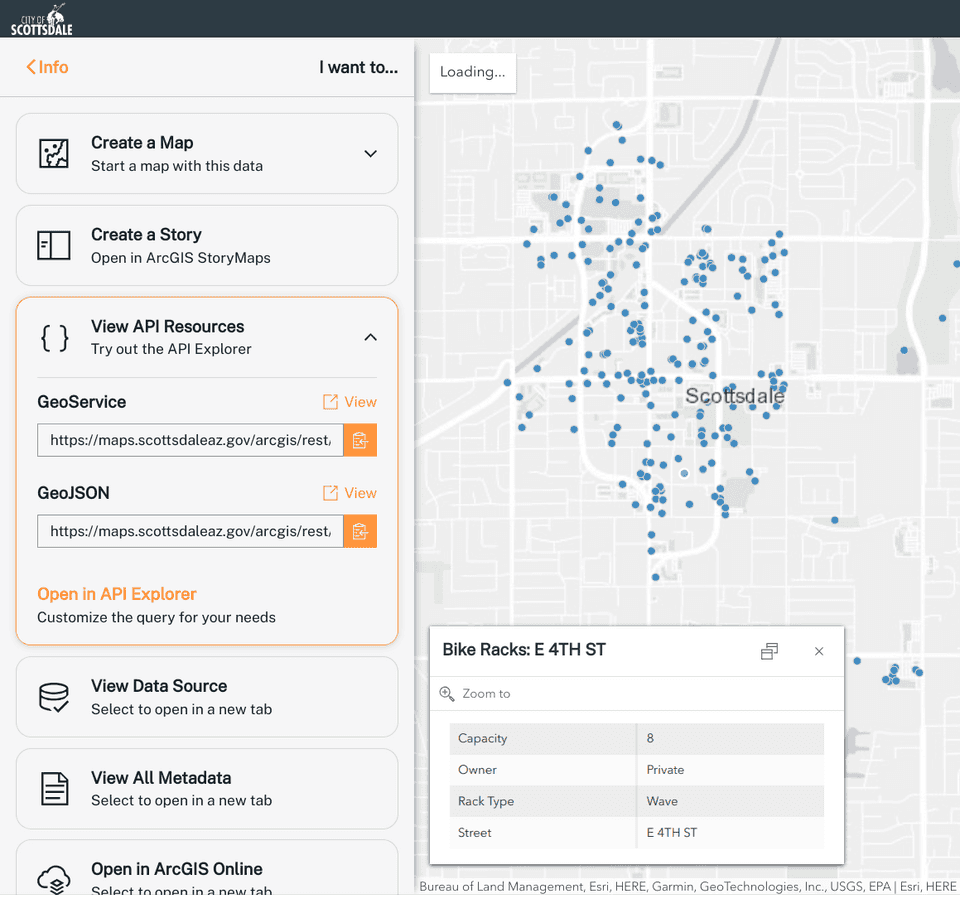
Community Engagement. The Open Data Publishing process and Data Services Process map involve community engagement at multiple steps of the process. The data team is constantly monitoring service usage and uses that information to determine which datasets the city should invest in and which datasets can be phased out.
Local Government Crosstalk Scottsdale works with other Arizona cities as part of the Arizona Data Community, sharing best practices and working to make data interoperable. Currently the cities around Phoenix (Tempe, Glendale, Mesa, etc.) are working to establish a standard to provide regional fire reporting data.
Stakeholders
Community Members. The community holds the government accountable. ScottsdaleEZ dashboard empowers community members to view and audit their data, from permit processing times to roadwork and construction delays. Kari Johnson, the director of Scottsdale’s data program repeatedly stated that data is an asset which belongs to the citizens, the city government is just the steward of this resource.
Local Business Owners. Local business owners are strong data customers, and are invested in the accuracy and accessibility of data. Business owners are one of the primary customers of Scottsdale’s latest dashboard which shows the license compliance status of short term rentals.
Kari Johnson. Scottsdale Business Intelligence Manager, director of open data programs. Works to educate and inform citizens on using data, develops strategic plan for data programs and guides development of data tools. Interfaces with the Bloomberg What Works Cities program.
-
Data Stewardship Kari Johnson highlighted that she and her team are data stewards for the government, the data is an asset owned by the public and citizens are entitled to use data to the maximum extent possible.
-
Internal Data Governance The Scottsdale government data team works with other local cities to provide a consistent experience for citizens. This also includes using municipal data to serve regional data aggregation. The Arizona Data Community has enabled efficient crosstalk and helped many cities in the area achieve Gold or higher classification in the Bloomberg Philanthropies What Works Cities.
-
Strategic Planning The Scottsdale open data program is guided by an internal road map that is not published to the public. Elements of it are nested in the strategic goals in the Scottsdale General Plan. The appetite for data analytics is growing and it will be interesting to see how the tools the data team creates change with the demand. There is interest in exploring AI and more advanced predictive models, but the demand for specific services does not appear to have caught up.
Technology Interventions
Water Conservation. Scottsdale uses predictive analytics to model water usage and anticipate long term needs. These models have improved with smart monitoring and analytical tools resulting in a difference of .4% from predicted to actual water use. This has allowed Scottsdale to achieve what is called “safe yield” where the city pumps less groundwater out of its aquifers than it puts in – for more than 20 consecutive years. Additionally Scottsdale developed a smart water conservation application to automatically identify landscaping to enhance water conservation efforts. This system reduces the administrative process of identifying opportunities to reduce water use.
Short-term Rental Resource Center. Most recent flagship data application allowing residents to view the license status of short-term rentals in their neighborhoods and understand the impact of zoning and compliance (https://str.scottsdaleaz.gov). Combines public city data and private data from RentalScape to show licensed and unlicensed units. Recognized by Bloomberg Philanthropies What Works Cities (Gold Level) as an effective and innovative data service. This services demonstrated the full product life cycle of a data tool created by the city. Initiated due to predicted demand and developed with community input, the program now saves time and resources for residents and city employees alike.
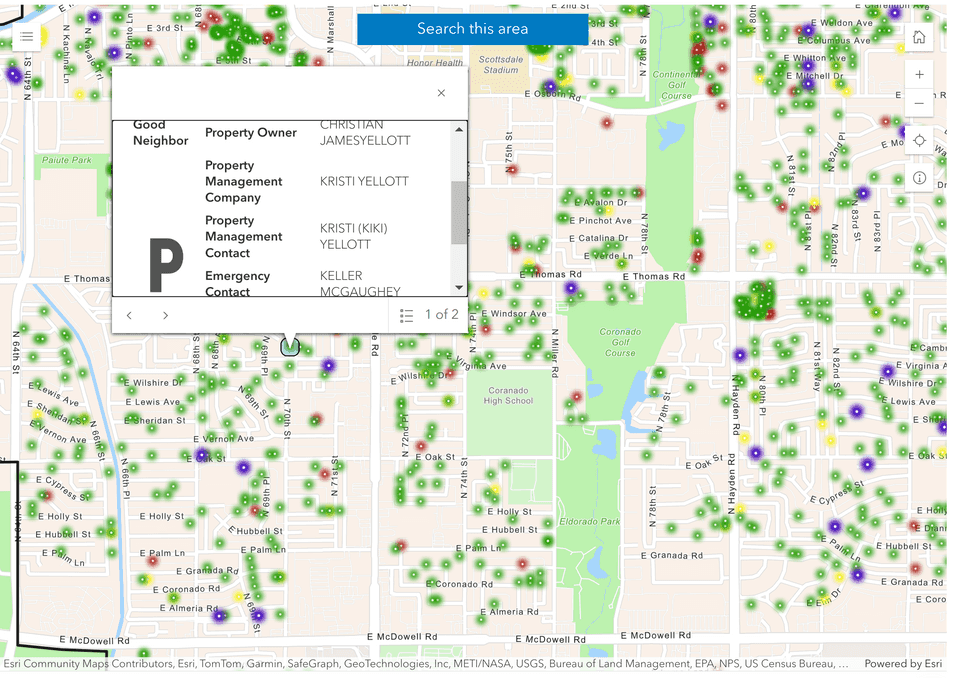
Behavioral Insights Team Scottsdale (BITS). Team of internal consultants to apply behavioral science to city projects, such as randomized control trials to test effectiveness of messaging. These trials enabled the city to select messaging on utility bills that encouraged customers to donate to local non-profits, increase volunteer recruitment, and increase adoption for paperless billing. BITS uses data tools to support decision making and guide policy.
Community Applications. Public developers can use Scottsdale APIs to add functionality to their services. These include shopping, real estate, and parking applications. Scottsdale uses its own Open Database License Agreement which establishes authorized uses and helps protects the city from data misuse.
Financing
City Budget. Information Technology is nested in Administrative Services and is allocated 85 full time employees and a budget of 18M (2023/24 Budget). The data team is currently comprised of three employees and has the smallest budget in their organization. Originally started with no budget at all, the program now maintains enough resources to provide about 50 full time datasets. The city of Scottsdale references data services in four of its seven Strategic Goals, and some resources are inter-agency, such as department of corrections and departments of education, which share data but maintain most of their own systems.
What Works Cities The Bloomberg Philanthropies program What Works Cities provides valuable resources and knowledge to cities pursuing data effectiveness. Scottsdale joins Phoenix, Tempe, Glendale, Mesa, and Gilbert (all in the Phoenix local area) in achieving Gold or higher certification.
Other Sources Due to the licensing of public data, there are few additional sources of financing. One example that came up in interviews with Kari Johnson was that the data team sometimes gets requests to license datasets commercially (such as mapping data to improve Google Maps) but public data cannot be licensed commercially so the city does not sell data.
Outcomes
Educating Citizens. Many of the datasets offered on the ScottsdaleEZ Dashboard were created either due to demonstrated or anticipated demand from citizens. Constantly auditing data usage enables Scottsdale to invest in most needed and used services. Serving this data heads off requests for data that the city would otherwise receive and respond to individually. This builds efficiency and makes for a more transparent and seamless experience for citizens. Data literacy also supports digital transitions in other areas such as online billing and utility monitoring.
User Generated Services Citizens can use open data to develop services that comply with Scottsdale Open Dataset License Agreement. These projects have the potential to apply resources otherwise unavailable to city government directly to citizen concerns. While there have so far only been a few applications using Scottsdale’s dataset APIs, there is huge potential as data availability grows for citizens to develop their own tools. These datasets are also critical to researchers working on a large range of topics from crime to water conservation and fire management.
Audits. Datasets are referenced in many of Scottsdale city audits. For example, in the 2023 Scottsdale Unified School District Human Resources Audit (Audit 2311) improved data reliability and availability was identified as a requirement to better inform district’s retention strategies and performance monitoring. This is a common finding and is referenced in the Scottsdale General Plan. The demand for accurate and transparent data (and the analytics that come with it) is constantly growing. Government audits may be a driving force for maintaining improved data stewardship.
Open Questions
Unintended Consequences. I asked Kari Johnson if there had been any unintended consequences of providing public data in an easy to use format. The answer I received indicated two things. First, the current datasets being published are attracting researchers from a variety of fields that want to work with the city and its data. This can increase the workload on data stewards as researchers often have specific needs that may not overlap with the government’s primary customer which is its citizens. This can also be positive as it attracts research that might inform decision making which would otherwise not focus on Scottsdale in the first place. The second unintended consequence we discussed was the publication of police data. This has been one of the most popular datasets the city releases, however it does include sensitive information about arrests that have not been fully adjudicated in the courts. This information is public and accurate however it does not paint the full picture of the justice system and can be misinterpreted or misused.
Algorithmic fairness. Published data is sanitized for release however it is difficult to assess how well this is done. Additionally as the appetite for data dashboards and finished analytical tools grow, government services will take on the responsibility of not only providing data but also analysis and assessment. If predictive models are being used, or assessments are being made, algorithmic and analytical fairness needs to be considered. It is unclear what the audit process for these topics will look like as the issue evolves.
Budget alignment. Are there negative consequences to saving money?
Public backlash. Is the public on board because of philosophical alignment or because nothing has gone wrong so far?
Urban Systems Profiles
Additional explorations undertaken by students in Cornell Tech's Urban Systems course build on this case study. During this course, taken by students in Urban Tech concentration in their first semester, students explore two types of urban systems—"hard" and "soft"—and emergent urban dynamics arising at the intersection of these systems.
-
Analysis of Urban Transportation in Scottsdale: Focuses on Scottsdale's transportation infrastructure, including bike lanes, bus routes, and car-centric planning. Highlights challenges like traffic congestion, limited public transit options, and opportunities to expand smart transit systems and alternative transportation modes.
-
Scottsdale Soft Systems: Urbanization and Social Concerns: Explores Scottsdale's resistance to urbanization and reliance on private vehicles, emphasizing cultural, environmental, and economic factors. Discusses debates over light rail expansion, homelessness, and community-driven urban planning initiatives.
-
Emergence and Urban Dynamics in Scottsdale: Analyzes Scottsdale's future urban planning dynamics, including potential impacts of light rail and economic development strategies. Key themes include balancing urban growth with community character, enhancing public transit, and addressing socio-economic disparities.
References
Primary Sources
- City of Scottsdale – AR 135 Digital Privacy. 2021, December 21.
- City of Scottsdale
- City of Scottsdale - Submit request. (n.d.).
- Open Data Scottsdale. (n.d.).
- Scottsdale Fiscal Year 2023/24 Adopted Budget, Volume One – Budget Summary
- Scottsdale Fiscal Year 2023/24 Adopted Budget, Volume Two – Division Operating Budget
- Scottsdale Data Services Standard, 2023, February 16.
- Scottsdale Open Data Publishing Process, 2017, October 2.
- Scottsdale Open Database License Agreement.
- U.S. Census Bureau. (n.d.). Explore Census data.
- City of Scottsdale - General Plan. (n.d.).
- City of Scottsdale - High performance and innovation. (n.d.).
- City of Scottsdale – AR297 Open Data Program. 2023, March 17.
Secondary Sources
- What Works Cities. (2023, December 19). Scottsdale, Arizona, USA | What works cities. https://whatworkscities.bloomberg.org/cities/scottsdale-arizona-usa/
- Cities, W. W. (2021, December 9). From the Pony Express to AI Traffic Control: Scottsdale Drives toward the Future with Data. Medium. https://medium.com/what-works-cities-certification/from-the-pony-express-to-ai-traffic-control-scottsdale-drives-toward-the-future-with-data-c2c5a62d240
- One-Stop shop for Arizona open data. (2019, February 6). Esri. https://www.esri.com/about/newsroom/arcuser/one-stop-shop-for-arizona-open-data/
- City of Scottsdale - Scottsdale captures award for using innovative technology to positively impact residents and businesses. (n.d.). https://www.scottsdaleaz.gov/news/scottsdale-captures-award-for-using-innovative-technology-to-positively-impact-residents-and-businesses
- High-tech ‘toys’ monitoring Scottsdale noise. (2023, December 2). https://www.scottsdale.org/city_news/high-tech-toys-monitoring-scottsdale-noise/article_c66cf6e8-8973-11ee-a7d7-5bea6bde6fed.html
